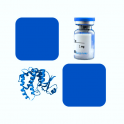
- Remove this product from my favorite's list.
- Add this product to my list of favorites.
Products
Newsletter
 |  |  |  |  |  |

Background
Ephrin-B1 (EFNB1) is also known as EFL-3, ELK ligand, EPH-related receptor tyrosine kinase ligand 2 (LERK-2), which belongs to the ephrin family. EFNB1 contains one ephrin RBD (ephrin receptor-binding) domain. EFNB1 binds to the receptor tyrosine kinases EPHB1 and EPHA1. EFNB1 binds to, and induce the collapse of, commissural axons/growth cones in vitro. EFNB1 may play a role in constraining the orientation of longitudinally projecting axons. EFNB1 interacts with GRIP1 and GRIP2.
Source
Recombinant Human Ephrin-B1, His Tag (EF1-H5223) is expressed from human 293 cells (HEK293). It contains AA Leu 28 - Gly 232 (Accession # NP_004420).
Predicted N-terminus: Leu 28.
Molecular Characterization
This protein carries a polyhistidine tag at the C-terminus.
The protein has a calculated MW of 23.6 kDa. The protein migrates as 32-40 kDa under reducing (R) condition (SDS-PAGE) due to glycosylation.
Endotoxin
Less than 1.0 EU per μg by the LAL method.
Purity
>95% as determined by SDS-PAGE.
Formulation
Lyophilized from 0.22 μm filtered solution in PBS, pH7.4. Normally trehalose is added as protectant before lyophilization.
Reconstitution
See Certificate of Analysis for reconstitution instructions and specific concentrations.
Storage
For long term storage, the product should be stored at lyophilized state at -20°C or lower.
Please avoid repeated freeze-thaw cycles.
This product is stable after storage at:
-20°C to -70°C for 12 months in lyophilized state;
-70°C for 3 months under sterile conditions after reconstitution.
(1) "Engineered cocultures of iPSC-derived atrial cardiomyocytes and atrial fibroblasts for modeling atrial fibrillation"
Brown, Han, Michell et al
Sci Adv (2024) 10 (3), eadg1222
(2) "Interaction between the EPHB2 receptor and EFNB1 ligand drives gastric cancer invasion and metastasis via the Wnt/β-catenin/FAK pathway"
Hu, Xie, Zhao et al
Int J Biol Macromol (2024) 258 (Pt 1), 128848
(3) "Aberrant epithelial cell interaction promotes esophageal squamous-cell carcinoma development and progression"
Chen, Zhu, Liu et al
Signal Transduct Target Ther (2023) 8 (1), 453
Showing 1-3 of 517 papers.
Follow us